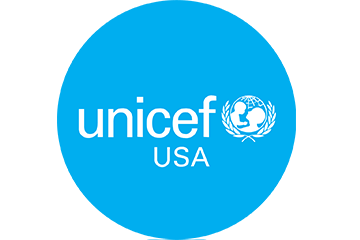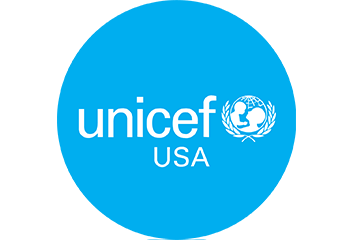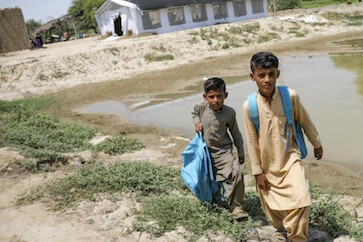Every year, Black History Month inspires a renewed recognition and appreciation of the treasured legacy of the African American community with an eye toward the future. It is the spirit of this commemoration that fuels ongoing advocacy, while drawing from the lessons of African American history. Delving into that history has become an important validation of the power of remembrance. It also helps to ignite action to advance important social justice endeavors.
This month is a critical moment to acknowledge the multitude of African American champions as social justice connectors who have helped raise awareness about the need to meaningfully extend their reach to the rest of the world. These interconnections augur well for rights-based inclusive programs that can help children in the Diaspora survive and thrive, through sustainable partnerships.
The African American community has made significant contributions to UNICEF USA’s mission, fundraising and advocating in support of UNICEF’s global work for children. Prominent African American organizations, through their U.S.-based members, have indeed made a difference to children in the African Diaspora by ‘promoting remembrance’ through their outreach and awareness-raising campaigns.
UNICEF USA’s Diaspora and Multicultural partners have made a significant difference to children in the African Diaspora by supporting the work of UNICEF and through their other outreach. Above, sisters in Les Cayes, Haiti, whose family received lifesaving emergency assistance from UNICEF in the wake of Hurricane Matthew. © UNICEF/UNI274175/Bradley
Many of our partners have been motivated to act by recent events; in particular, the COVID-19 pandemic and its disproportionate impact and ripple effects on the Black community. They have rallied with UNICEF USA to put a spotlight on complex humanitarian crises, so often neglected by mainstream media, such as the conflict and resulting plight of children in Haiti, Ethiopia and elsewhere. They have added their voices to calls for the respect of children’s rights, joining the fight to end child marriage, address learning poverty and protect children from violence.
African American communities have also joined UNICEF USA in advocating for equitable access to coronavirus vaccines for all vulnerable populations, both in the U.S. and around the world.
Black History Month provides an opportunity to reflect on the strong connections that UNICEF has built over many decades with the African American community. These relationships are but an extension of the linkages to scores of countries where UNICEF’s local staff work to advance the livelihoods of all children, including those of African descent.
A variety of campaigns are underway helping to raise awareness about this relationship building. Here are a few highlights:
Protecting Black communities from the impacts of COVID-19
The Black Women’s Agenda, a collaborative of 24 major national African American women’s organizations, has been working throughout the pandemic to share information with the Black community on how to mitigate the effects of the pandemic in education and on mental health, particularly for women and girls.
As an extension of these efforts, BWA has launched a national COVID-19 public health education social media campaign focused on increasing vaccine confidence and uptake of COVID-19 vaccines. UNICEF USA will join BWA for a virtual Town Hall on Feb. 24 entitled, “I Am the Change: Addressing COVID-19 Here and Now!” during which UNICEF USA will share information about UNICEF’s leading role in the largest and fastest immunization campaign in world history and other components of the global COVID-19 response.
A social mobilizer for UNICEF shares information about COVID-19 prevention in Yambo, South Sudan. © UNICEF/UNI315572/Ongoro
Connecting community outreach to UNICEF’s global vision
Delta Sigma Theta, Inc., a historically African American sorority dedicated to public service and known for its emphasis on sisterhood, scholarship, service and social action, has worked in association with UNICEF USA since 1988. As one of the largest of the “Divine Nine” sororities, with an initiated membership of more than 400,000 — including key “movers and shakers” from the nonprofit world, politics, entertainment and corporate America — DST’s outreach is immensely effective in helping to raise awareness and funds in support of UNICEF USA’s advocacy and UNICEF’s mission on behalf of the world’s children.
Recent outreach efforts — Delta Days at the United Nations, the annual Founder’s Day and Regional Chapters Social Action Week — have focused on climate change, child protection programs in Africa and support for education emergencies in Haiti, Kenya and the Central African Republic.
“Delta Sigma Theta’s partnership with UNICEF USA is a collaboration like no other,” says Elsie Cooke-Holmes, DST National President and Chair, National Board of Directors. “Together, we are combatting challenges like gender-based discrimination and educational inequality, while also promoting healthy behaviors in physical and mental health. Our 1,000-chapter strong organization remains committed to continue our partnership with UNICEF USA as we transform the livelihoods of children across the globe.”
The DST partnership has been particularly poignant this year with the death of Cheryl A. Hickmon on Jan. 20, a respected DST leader and member since 1982 who was elected National President on Nov. 21, 2021.
The late Cheryl A. Hickmon, second from right, served as Delta Sigma Theta’s national president from November 2021 until her death in January. She is pictured here with other members of Delta Sigma Theta, Inc., a UNICEF USA partner, during a trip to East Africa with UNICEF in 2018. © Photo courtesy of DST
Jack and Jill of America Inc. is another noteworthy group that has worked with UNICEF USA in alignment with its mission to address the needs of African American children and families. As a membership organization of mothers with children ages 2 through 19, Jack and Jill is dedicated to nurturing future African American leaders by strengthening children through leadership development, volunteer service, philanthropic giving and civic duty.
National President Kornisha Brown partnered with UNICEF USA during the UN’s 2021 Global Forum for Children and Youth for a discussion about the achievements and the potential of Diaspora communities in the U.S. and their desired global impact on international development.
“We understand more than ever the need to teach our children about the importance of addressing the needs of our own communities and our role on a global level, working on issues related to health care, climate change, poverty, violence, racism and so much more,” Brown says. “Supporting UNICEF,” Brown adds, “is an opportunity for members to have that global impact, and to help transform communities — one community at a time.”
Supporting UNICEF is an opportunity for our members to have that global impact, and to help transform communities — one community at a time. — Kornisha Brown, National President, Jack and Jill of America
Jack and Jill has mobilized its families to contribute to the Trick-or-Treat for UNICEF campaign, and plans are underway to promote a global curriculum with Jack and Jill families to increase awareness and support for Haiti, Ethiopia and other areas in the Diaspora that are in crisis.
Another organization connecting its U.S.-based initiatives to UNICEF’s global work is The Links Inc., an international not-for-profit and one of the largest (with 16,000 members) and oldest volunteer service organizations in the U.S. for women of African ancestry.
“We have come together with UNICEF USA through program site visits and in public forums to raise awareness about issues in Africa and the Caribbean,” says Kimberly Jeffries Leonard, The Links’ National President. “This relationship has deepened our commitment to bolster the development of schools, clinics and other areas of need throughout the Global South.”
After the August 2021 earthquake destroyed 738 schools in Haiti, UNICEF delivered school supplies to 80,000 children in affected areas. Above, students in Port-Salut, Les Cayes department. © UNICEF/UN0568462/Diaz Mercado
Collectively confronting challenges affecting Black communities across the Diaspora
Moments like Black History Month remind us just how pivotal — and powerful — the impacts of partnerships are throughout the year. UNICEF USA is committed to building on these and other collaborations with our fellow advocates for Diaspora children and families — groups like the National Medical Association have engaged with UNICEF, as have other professional associations, sororities and fraternities and churches. UNICEF USA is steadfast in upholding the importance of African American voices and engagement from the Diaspora as key to enhancing UNICEF’s global programs.
UNICEF USA is eager to reinforce these relationships and build new ones in the near future, believing these connections are critical; and that by standing together, and reaching out to our respective networks, we can collectively confront challenges affecting Black communities across the Diaspora, from Brooklyn to Barbados to Benin.
UNICEF works in over 190 countries and territories to save and protect the rights of all children and to ensure equitable opportunities for young people to reach their full potential. UNICEF USA supports that mission through fundraising, advocacy and education in the U.S. and through our own domestic programs.
Help UNICEF save and protect vulnerable children. Donate today.
Anne-Marea Griffin leads work for the Diaspora and Multicultural Partnerships as Senior Director for UNICEF USA Global Cause Partnerships. For partnership inquiries, email: [email protected]
Top photo: Children gather in Abi Addi, a town located in central Tigray, Ethiopia, where UNICEF is working with partners to meet urgent humanitarian needs due to ongoing conflict in the region — delivering health care, nutrition, education support and protection to the most vulnerable. © UNICEF/UN0539135/Leul Kinfu





